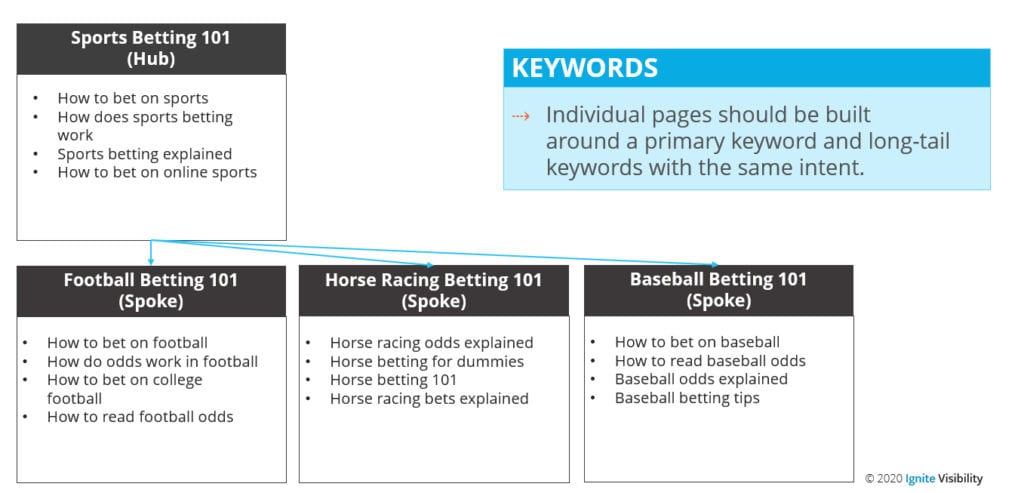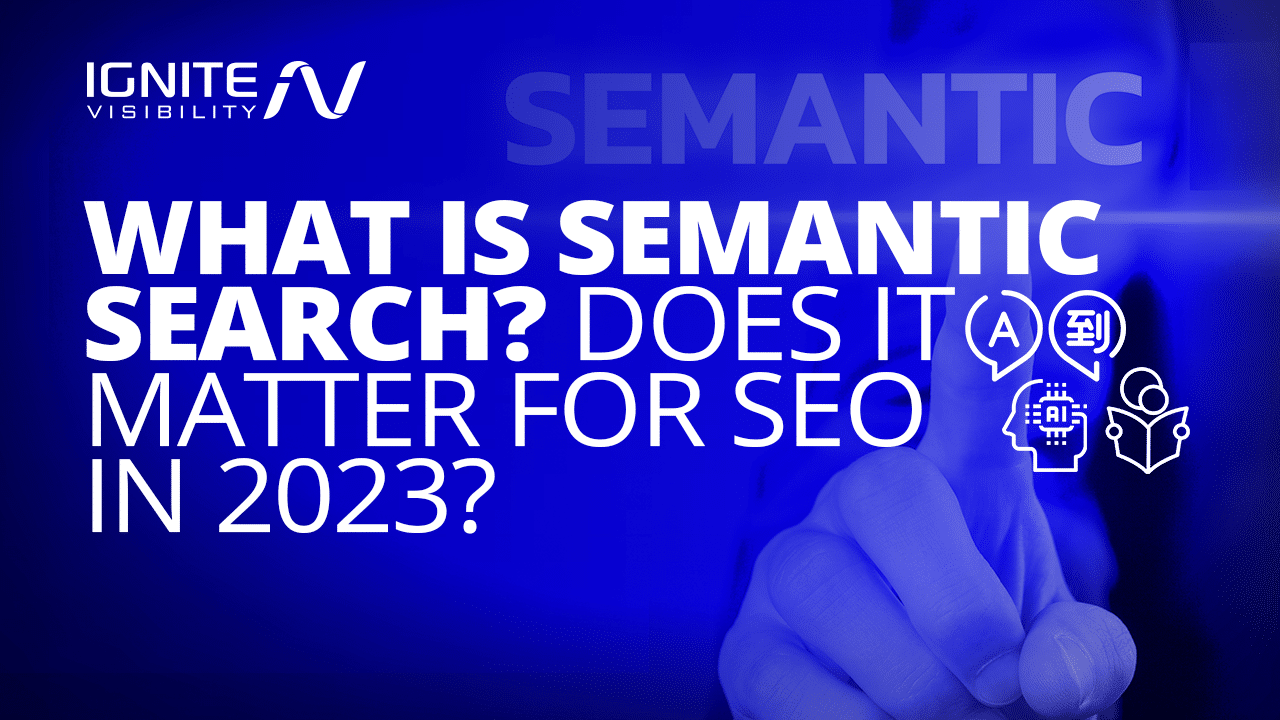
As search engines become more advanced, they find new ways to process queries and return better results. Semantic search is a significant advancement that helps search engines interpret the true meaning behind a search query rather than simply matching keywords.
So in this article, we’ll explain how semantic search works and how to leverage it to maximize visibility.
What is Semantic Search?
Semantic search is a technology using natural language processing (NLP) to interpret the user’s search query and infer the user’s true intention. Search engines can understand the intention and context of a query and deliver more relevant search results.
For example, say a user searches, “can my car run on vegetable oil?” A semantic search would interpret this query to look for results related to converting a car to run on vegetable oil rather than generic results about vegetable oils.
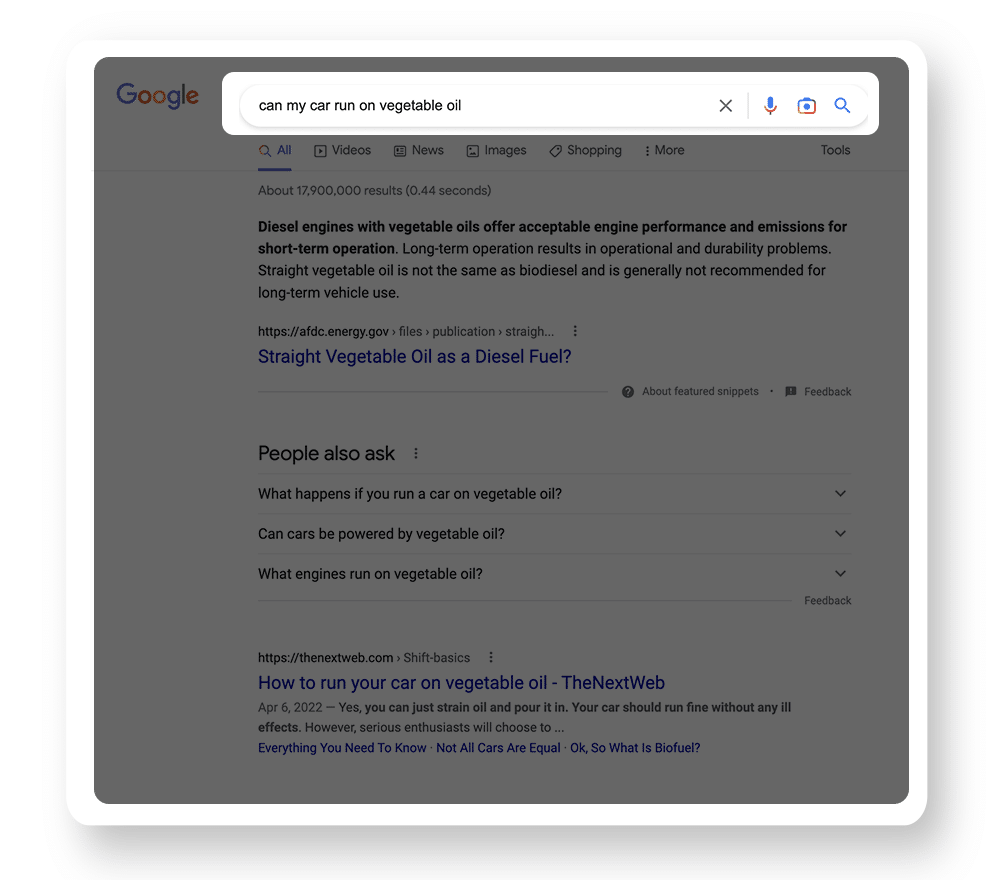
Semantic Mapping
Search engines rely on semantic mapping to support semantic search. The process works by breaking down search queries into individual words and understanding the relationship between each of the words.
It works by searching for synonyms and related terms for each word and assessing the user’s intent. For example, when a user searches for “running shoes,” the search engine will look for related terms like “sneakers,” “athletic shoes,” “shoe lace,” etc.

Semantic Search – Running Shoes
Another example of semantic search engine mapping is when a user searches for a two-word phrase. Semantic mapping allows the search engine to match related word combinations, such as “soccer gear” and “football equipment.”
Similar to how a thesaurus can map together words with similar meanings, such as “large” and “big,” a search engine can give more accurate and reliable results by understanding the nuances between different words.
Understanding Semantic Search
Semantic search is a significant factor in ranking pages in search results.
By understanding the user’s intent, semantic search can match more relevant pages to a particular query. Therefore, SEOs must pay close attention to intent-based keyword research and use targeted content to match the most relevant queries.
Searcher Intent
Searcher intent is why a person enters a search query into a search engine. In other words, it’s the ultimate goal the user has in mind when searching.
Although most search queries are a few words, searcher intent can range from informational to transactional.
For example, a user may search “running shoes” to learn more about the product (informational intent) or purchase a pair of shoes right away (transactional intent).
By understanding what people are looking for when searching for a specific query, you can create targeted, helpful, and engaging content. This is what search engines want to see and what users expect from their search results.
Another example might be someone searching for “how to start a blog.”
It may tempt you to write an article about optimizing a blog for search engine rankings. However, this won’t be useful to your reader since they are likely looking for information on creating a blog from scratch.
So instead, create an article that covers all the steps of starting a blog, such as setting up a hosting provider, installing a content management system, creating content, etc.
This will be more useful to the user and likely to rank high in SERPs since it’s more closely aligned with what they’re actually looking for.
It’s like a tailor making a suit: the more accurately it fits, the better it looks and works. Here, the better your content fits your customer’s needs, the better its chance of success.
SEOs must research various keywords for the same product or service. And since the same query can have multiple searcher intents, each keyword should target the right audience.
Query Context
Query context refers to how the user frames their search query.
What kind of words are used? What is the user’s tone? Is the question directed to the search engine or someone else?
Understanding the query context is crucial because it can reveal the underlying intent behind the query.
For instance, someone searching for “does a car need oil” is likely looking for an answer to a specific question, whereas someone searching for “buy car oil” is likely looking to purchase car oil immediately.
How Can Semantic Search Impact SEO?
Semantic search has a major impact on SEO.
Since search engines can now interpret the true intention behind a search query, SEOs must focus on creating content that matches the user’s intent. As explained above, this means optimizing content for topics rather than just keywords.
Voice Search
Voice search is also heavily dependent on semantic search. Since most search technologies like Alexa and Google Home respond to natural language queries, understanding the user’s intent is essential for providing accurate answers.
Optimizing for voice and semantic search are intertwined, since the same principles apply. SEOs should focus on creating content that answers specific questions while using natural language.
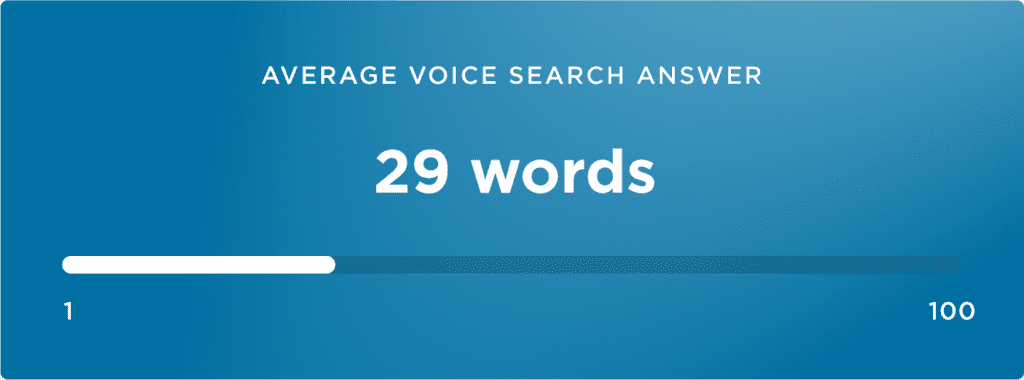
Prioritizing Topics
Semantic search engines also mean it’s time to shift your focus from optimizing for individual keywords to optimizing for topics. This means writing content that covers various aspects of a topic rather than targeting a single keyword.
Marketers also know this strategy as the hub and spoke model.
For example, think about the keyword “sports betting” Rather than just writing about “sports betting,” SEOs should create content about related topics such as football betting, hours racing betting and baseball betting.
This will help create more comprehensive and engaging content for readers and help the content rank higher in SERPs since it will be more relevant to what people are searching for.
It will provide more opportunities to include keywords related to sports betting, which will further boost the content’s visibility.
Google Wants to Provide Users with a Better Search Experience
Google’s goal has always been to create a better user experience.
Throughout the years of algorithm updates, the focus has always been to reduce the amount of spammy and irrelevant content by assigning more value to pages that meet what users expect.
Semantic search is Google’s attempt to understand a query better and offer the best results for the user.
And as shown in the 2022 Helpful Content update, Google will continue to reward SEOs who provide quality, helpful, and well-researched content.
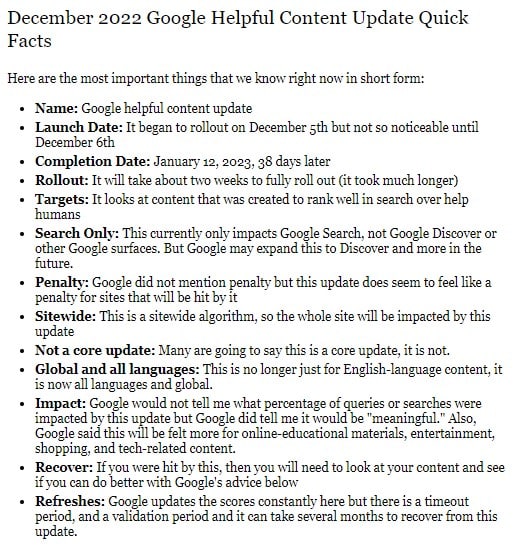
Google Helpful Content Update
Technical SEO Remains Crucial
Semantic search is just one part of Google’s ranking algorithm. Although content is a significant factor in how a page ranks, technical SEO is still essential to ensure the search engine can crawl, index, and interpret the content.
Some areas you should focus on in particular include:
- Keywords in Metadata: Including relevant keywords in the title and description tags of your pages will help search engines understand what your content is about.
- Link Building: Earning high-quality backlinks from reputable websites will help boost your content’s visibility.
- Structured Data: Structuring your content with schema markup will give search engines a better understanding of what the page is about and how it should be ranked in search results.
- Fixing Website Errors: Ensure all your pages are free of broken links, redirects, and server errors.
- Site Structure: Create a well-organized hierarchy of your content to make it easier for search engine bots (and users) to navigate your site.
- Coding Headings: Use proper headings on your pages (i.e., H1, H2, etc.) to indicate the content’s structure and main topics.
Also, make sure your content is optimized for mobile and tablet devices and desktops. Responsive design is a top-ranking factor, so ensure your pages are user-friendly no matter the device.
Semantic Search and EEAT
The last part of the equation is EEAT (Experience, Expertise, Authoritativeness, and Trustworthiness). The newest addition—experience—appeared in Google’s December 2022 update of its Quality Rater Guidelines.
- Experience refers to the knowledge the searcher expects from the content. For example, someone searching “How to diagnose a car overheating problem” expects to see content from an auto mechanic or a car expert.
- Expertise speaks to the quality of the content. Google looks for content that is well-researched and thoroughly explained.
- Authoritativeness means the content should be from a trusted, authoritative source you can trust for its accuracy.
- Trustworthiness is about reputation. Is the content from a reliable source? Has it been verified by other experts or organizations?
If you don’t know, Google uses human Quality Raters to evaluate websites and pages according to specific criteria. This helps them understand which content should show up in SERPs and which should be demoted—or not shown at all.
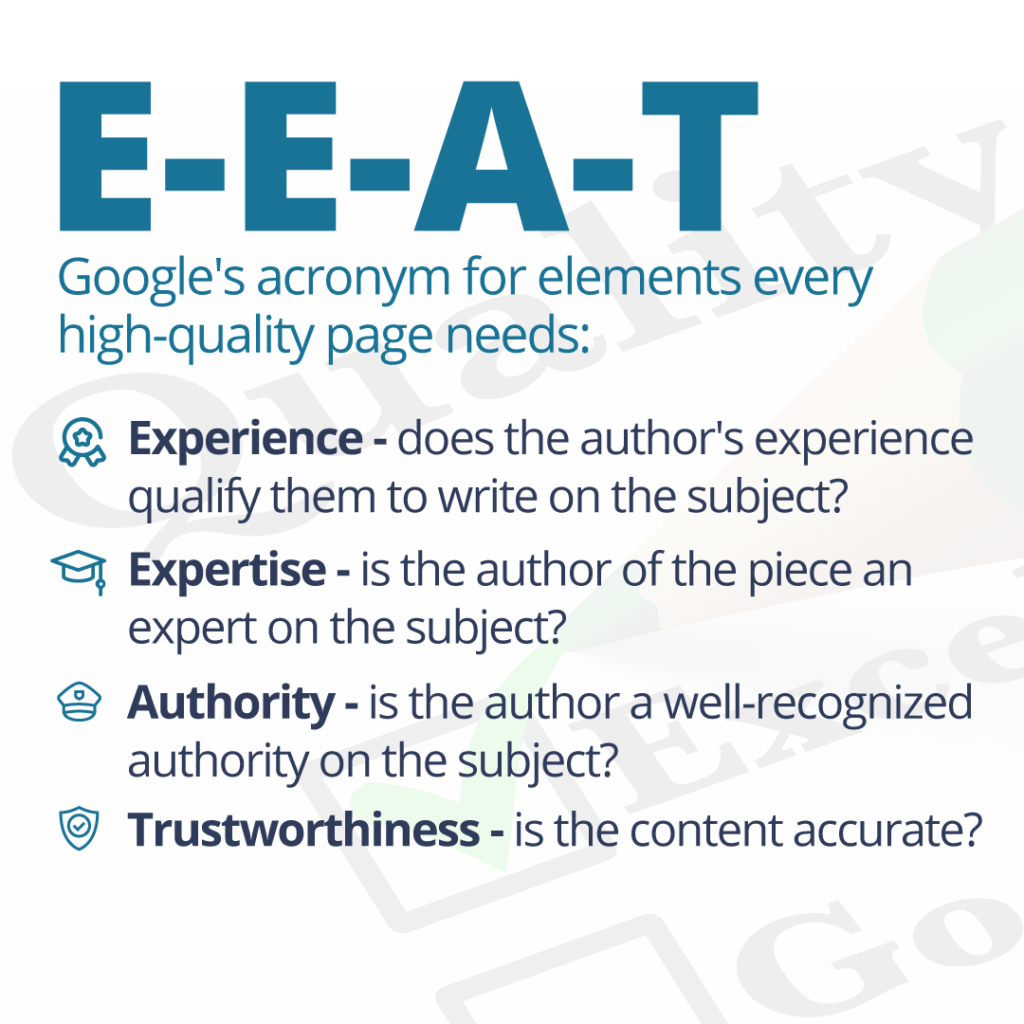
E-E-A-T
What is Latent Semantic Indexing?
Latent Semantic Indexing (LSI) is a technology supposedly used by search engines to better understand the meaning of words in a query. It looks at the context in which a word appears and tries to understand the implied meaning of the term and how it relates to other words.
There’s no evidence that Google uses LSI, an old technology. LSI was created in the 1990s and was never intended to be used by search engines. The technology is slow and requires a tremendous amount of computing power.
Modern search engines use semantic technologies that are more powerful and much faster than LSI. These technologies focus on understanding the meaning of the entire query instead of just individual words.
For example, say someone searches for the term “BMW.” Using LSI, the search engine understands this term could refer to the German car company, the model of a car, or its motorcycle brand.
However, when a user searches for “automotive repair services near me” with modern search engines, they will be presented with results of car repair shops near them (or whichever geographic region the query was made from).
This is due to the search query being analyzed as a whole instead of broken down into individual words.
As search engines improve their ability to understand the intent behind queries, the relevance of LSI becomes increasingly small. Google’s Natural Language Processing (NLP) algorithm is far more powerful and accurate for understanding user queries.
Semantic Search FAQs
1. How does semantic search relate to SEO?
Semantic search is an integral part of SEO. Search engines like Google use semantic technologies to better understand a search query’s meaning and provide more relevant results. Optimizing your content for semantic search helps to ensure the right people will see it, thus improving your visibility and rankings.
2. What is Latent Semantic Indexing?
Latent Semantic Indexing (LSI) is an old technology used to understand the meaning of a single word. It uses context clues to understand the implied meaning of a term and how it relates to other words. LSI is an outdated technology and is not used by modern search engines.
3. What are the benefits of semantic search?
Semantic search helps search engines better understand the intent behind user queries. As a result, the search results served to users are more relevant and of higher quality. This benefits users as they can easily find what they’re looking for and increases engagement with content. It also benefits website owners, as more relevant content can cause higher rankings and more website visits.
Final Thoughts on Semantic Search
The core of semantic search is understanding the intent behind a user’s query.
Google’s EEAT criteria are essential in this understanding. By evaluating content based on experience, expertise, authoritativeness, and trustworthiness, they can better determine which content is the most relevant and should be offered to the user.
In terms of SEO, optimizing content for semantic search can help improve visibility and rankings. Understanding EEAT is essential in this effort and ensuring content is well-researched, authoritative, and written by an expert.
Finally, it’s important to note that LSI is an outdated technology not used by modern search engines. Instead, they rely on their Natural Language Processing (NLP) algorithm, which is far more powerful and accurate in understanding user queries.
So focus on the core of the user’s query and ensure authoritative sources back up every claim you make. With this approach, you can ensure your content is as relevant as possible and will be seen by the right people.
